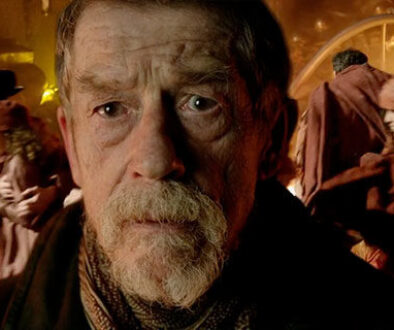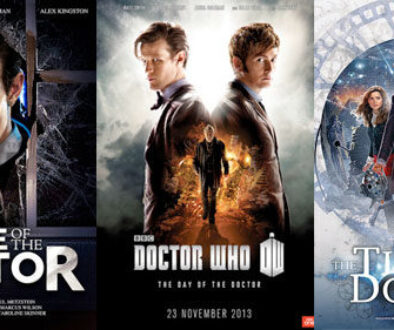Engines of War Review
Patrick Kavanagh-Sproull gives his verdict on George Mann’s War Doctor novel.

Perhaps if Steven Moffat had not introduced the War Doctor last year, we would have had Engines of War much sooner. That is to say, this book, one set in the kernel of the Last Great Time War, has taken a long time to reach our shelves – and it was well worth the wait. George Mann might not seem like the first choice as the man to helm the trials of the War Doctor (this is his third literary contribution to the show, following an excellent debut novel, Paradox Lost, and a story in the Tales of Trenzalore anthology recently released in paperback format) but he handles the weighty remit with a deft, confident hand, giving us the Time War novel we truly deserve.
John Hurt’s formerly secreted incarnation did not make much of an impact on me when he cropped up in The Day of the Doctor. It was, undoubtedly, because we spent little time alone in his company and it was hard to get a grasp on “Captain Grumpy”. Engines of War has boosted him up several notches on my list of favourite Doctors and I was left drooling for more. No hyperbole there. When we first meet him he is gruff, careworn, weary and sarcastic, numbed by the world-spanning battle. In my honest opinion, Mann conveys the War Doctor’s fierceness, brusquerie and total abandonment of the name ‘the Doctor’ and all that represents better than Steven Moffat did. He’s violent (but not without justification), sharp (again, not without reason) and disinclined to take on another companion (much like the Tenth Doctor during the 2009 Specials). However, there are flashes of playfulness, glimpses of the Doctor, our Doctor, underneath the rough façade and these add levity to the expectantly heavy story. John Hurt’s voice can be heard in every line (though, with a voice as gravelly and memorable as his, it’s hard not to hear him) and this is one of the areas where Mann excels most; he has such a strong understanding of the character that you can flit between wanting to hug the War Doctor and send him on a holiday to fearing him in just a couple of pages. Also, for those wondering what the War Doctor is referred to, Mann skilfully sidesteps the “Doctor no more” problem.
While I would have liked to have seen the likes of Romana or even Susan alongside the War Doctor, George Mann has created a companion that is one of the best. Cinder, a sparky, orphaned young Dalek hunter, encounters the War Doctor when he plummets onto the planet Moldox after being knocked off-course by a glancing laser. Their meeting is not dissimilar to Amy and the Eleventh Doctor in The Eleventh Hour and Cinder shares many characteristics with the feisty redhead (other than their hair colour). Elements of Cinder also reminded me of Ace, the Seventh Doctor’s baseball bat-toting companion, as well as lashings of Cass from The Night of the Doctor. Having said that, Cinder is a unique character and Mann instils her with every character trait you want in a companion, both negative and positive qualities. The only sad thing about Cinder is that she never appeared onscreen because she’s absolutely magnificent.
The Time War is an aspect of Doctor Who that has never been fully explored onscreen. That is, up until The Day of the Doctor. Mann does not shy away from the grit and meat of the Last Great Time War, doing some much more than simply scratching the surface. He dives deep into the orange, bloody, gritty, screaming, tragic, baked earth bloodbath, mercilessly showing the horror and obscenity and pain of the whole damned affair. He shows families ripped apart (one character is introduced simply to show how mankind behaves under duress, not shying away from the betrayal, agony and fear), the abhorrent experimental weaponry manufactured in the heat of the war and the horrible deaths and losses. Mann sucks you into the world so fiercely that there are moments where I had to look up and assure myself that it didn’t actually happen.
Engines of War takes us to both camps: the Daleks’ and the Time Lords’. We visit Gallifrey with as ropey politics as we last saw in The Deadly Assassin and The Five Doctors (look out for aspects of those stories that reappear). Mann depicts the Time Lord not through rose-tinted glasses but as frightened, pompous halfwits petrified of the war. That is to say, they are very much the same people we meet in The End of Time. It’s hard to go into detail without spoiling a considerable degree of the book but Mann shows each side of the Last Great Time War fairly and exactly how I imagined it (though, each to their own).
Given that Mann has been given the task of setting his book slap bang in the show’s most consequential period, he has quite a tight, precarious window in which to set Engines of War. He has to be careful in how he tackles certain aspects so that they don’t clash with the mythology of the battle established retrospectively in the revived series. I’m thrilled to say that he successfully slots his story into the Time War without altering anything and that the events of Mann’s novel have consequences of their own.
Verdict: 10/10
I try not to dish out full marks regularly but Engines of War warranted it so, so much. It’s a must-read, a well-needed insight into the Time War that is exquisitely written amongst other things. Mann has a sure grip of the War Doctor, a sublime companion, plenty of edge-of-your-seat action sequences but, above all, Engines of War gives scope and considerably more depth to the Doctor’s dilemma in The Day of the Doctor, helping us see why he really was so conflicted over using the Moment. More please, at the double.








